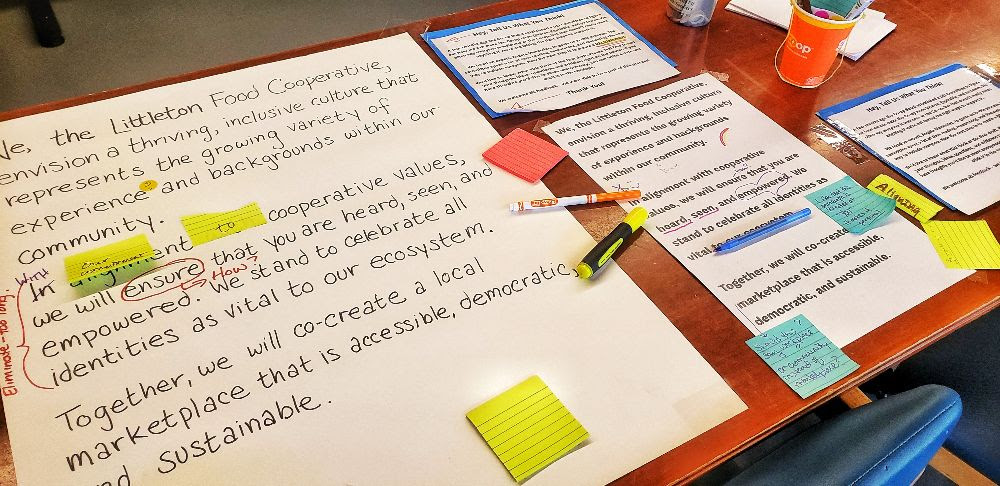We, the Littleton Food Co-op, envision a thriving, inclusive culture that represents the growing variety of experiences and backgrounds within our community.
We stand to celebrate all identities as vital to our ecosystem. Along with our commitment to cooperative values, we invite you to use your voice and presence. Together, we will co-create a local marketplace that is accessible, democratic, and sustainable.
Diversity, Equity, & Inclusion (DEI) are a crucial part of everything we do as a Cooperative, and in many ways, it’s written right into our Mission, our Vision, and the Cooperative Principles. We know that in order to support a thriving cooperative, it’s deeply important to be inclusive and hear from a diverse range of voices in the community.
In 2021 our Board of Directors made the decision to appoint a Committee to begin the process of drafting a DEI Statement for Littleton Food Co-op, in order to educate ourselves and better inform our efforts to create a more inclusive community, and implement policies that support that initiative. This committee includes some of our Board Directors, our Marketing and Community Outreach staff, and a consultant who specializes in developing DEI initiatives in business and non-profit organizations.
The first step involved many hours of meetings, brainstorming, and revisions to develop an initial draft that included our Mission, Vision, and the Cooperative Values and Principles. Once that was complete, we put the draft statement on some big posters and asked the Co-op’s employees for their input. We got a lot of great feedback and lots of enthusiastic stars, arrows, notes, and underlines! After a few weeks, the Committee met again to review the first round of feedback and prepare a draft to present to the wider community.
We then distributed our new draft to our wider community, via social media and our newsletter. We received a lot of insightful feedback from customers and Co-op Members. When the committee reconvened, we took many of those comments into consideration as we revised the final draft. We presented this to our employees at our annual All-Staff Meeting this summer.
Finally, the statement and a plan for implementation were presented to the co-op’s board of directors. The Board approved the final statement, four pillars, and action steps.
The Four Pillars
Our subcommittee identified four target pillars for action steps within our cooperative, which our board then discussed and voted to accept. These will help direct us in our ongoing commitment to diversity, equity, and inclusion.
Accountability & Transparency
Step One: Appoint an ongoing DEI subcommittee to oversee, report on, and assist in facilitating further DEI work at a board level. ✓
Communications & Engagement
Step One: Evaluate and adapt board policy, including the Ends Report, through the lens of DEI work.
Education & Training
Step One: Commit to, and complete, the Neighboring Food Co-op Association (NFCA) Learning & Growth Tool meant for internal DEI evaluation.
Sustainability & Accessibility
Step One: Commit to giving DEI a place within our yearly budget.
As always, we welcome your input and feedback, and we thank everyone who gave their time, thoughts, support, concerns, and ideas to this process. This is just the start, and we fully anticipate this will be an ongoing initiative going forward! We are looking forward to making the Co-op even more of a community where everyone is truly welcome.

Special Thanks To Our DEI Committee!
Vanessa Robbins, Board Director
Dani Shaw, Employee & Board Director
Matthew Whiton, Employee & Board Director
Becky Colpitts, Member Services & Community Outreach Coordinator
Angela Menendez, DEI Consultant
About Our Consultant, Angela Menendez

Angela is the head of Activate Inclusion, a local DEI and Leadership skills consulting agency here in the North Country. She specializes in developing inclusion, equity, transparency, and engagement in the organizations she partners with. Learn more about Activate here, or view her Linkedin.
Mission, Vision, & Principles
Our Mission
To provide a community-owned marketplace that supports local and promotes healthy choices for people and planet.
Our Vision
Our Co-op is a catalyst for cultivating a vibrant community and regional economy.
The Cooperative Principles
1. Voluntary and Open Membership
Cooperatives are voluntary organizations, open to all persons able to use their services and willing to accept the responsibilities of membership, without gender, social, racial, political or religious discrimination.
2. Democratic Member Control
Cooperatives are democratic organizations controlled by their members, who actively participate in setting their policies and making decisions. Men and women serving as elected representatives are accountable to the membership. In primary cooperatives, members have equal voting rights (one member, one vote) and cooperatives at other levels are also organized in a democratic manner.
3. Member Economic Participation
Members contribute equitably to, and democratically control, the capital of their cooperative. At least part of that capital is usually the common property of the cooperative. Members usually receive limited compensation, if any, on capital subscribed as a condition of membership. Members allocate surpluses for any or all of the following purposes: developing their cooperative, possibly by setting up reserves, part of which at least would be indivisible; benefiting members in proportion to their transactions with the cooperative, and supporting other activities approved by the membership.
4. Autonomy and Independence
Cooperatives are autonomous, self-help organizations controlled by their members. If they enter into agreements with other organizations, including governments, or raise capital from external sources, they do so on terms that ensure democratic control by their members and maintain their cooperative autonomy.
5. Education, Training, and Information
Cooperatives provide education and training for their members, elected representatives, managers, and employees so they can contribute effectively to the development of their cooperatives. They inform the general public – particularly young people and opinion leaders – about the nature and benefits of co-operation.
6. Cooperation Among Cooperatives
Cooperatives serve their members most effectively and strengthen the cooperative movement by working together through local, national, regional and international structures.
7. Concern for Community
Cooperatives work for the sustainable development of their communities through policies approved by their members.
Source: International Cooperative Alliance





